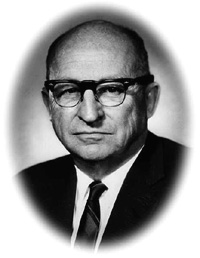 "Ed" Link was born in Huntington, Indiana, but moved in 1910 to Binghamton, New York,
where his father purchased a bankrupt music firm. The business was renamed the Link
Player Piano and Organ Company and it was here Ed would begin and develop his multi-faceted
career as an inventer, industrialist and pioneer in the fields of flight simulation,
underwater archaeology and ocean engineering. To quote his friend Harvey Roehl, Edwin
A. Link, Jr. was a "backyard inventor in the finest American sense."
"Ed" Link was born in Huntington, Indiana, but moved in 1910 to Binghamton, New York,
where his father purchased a bankrupt music firm. The business was renamed the Link
Player Piano and Organ Company and it was here Ed would begin and develop his multi-faceted
career as an inventer, industrialist and pioneer in the fields of flight simulation,
underwater archaeology and ocean engineering. To quote his friend Harvey Roehl, Edwin
A. Link, Jr. was a "backyard inventor in the finest American sense."
In his early twenties, at considerable expense and some risk, Edwin A. Link, Jr. obtained his pilot's license. While struggling to become a pilot, he began tinkering with parts of organs at his father's factory, trying to develop a training device so that pilots could start learning to fly safely and inexpensively without leaving the ground. Initially his Link Trainer, although successful, was seen as a toy and relegated to the status of fairground ride.
In the mid-1930's, after a series of air accidents, the Army Air Corps ordered six of Link's instrument trainers to enhance its pilot training program. Once public attention had been drawn to this practical device, orders for more came from all over the world. Ultimately Link's flight trainer (the Blue Box) led to the development of the whole field of flight simulation. With the help of his wife, Marion Clayton Link, whom he had married in 1931, Ed Link ran a highly successful enterprise, Link Aviation, Inc., throughout World War II and until he sold the company in 1954.
Thereafter Ed's skills and attention focused on underwater archaeology and exploration. In this, his wife, Marion, became his partner in research, and, with their two sons, William Martin and Edwin Clayton, they undertook a number of voyages. During these years, Ed Link worked constantly to improve diving equipment in order to allow divers to go deeper, stay longer underwater, explore more safely and efficiently, and return to the surface with less risk. On one of the sea voyages in 1973, during a routine dive in a submersible, the Links' younger son, Clayton, and his friend Albert Stover were killed. In a very moving statement to the press, Ed expressed his conviction that their death had not been in vain, but had identified problems which must be solved in order to meet the challenge of safer underwater exploration.
Link continued actively exploring, tinkering, writing and generally enjoying his many interests until very shortly before his death in 1981. His was an unusually generous spirit: not only did he give tirelessly of his time and energy; he also donated financially to many foundations, scholarships and charitable causes. His gifts to Binghamton University include the Edwin A. Link Organ Music Professorship, Binghamton's first endowed faculty chair.